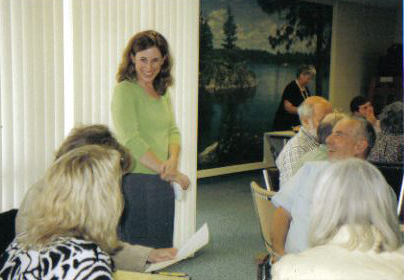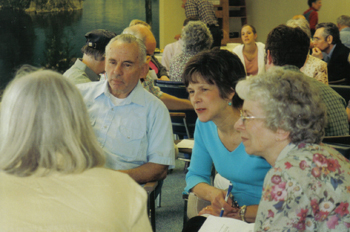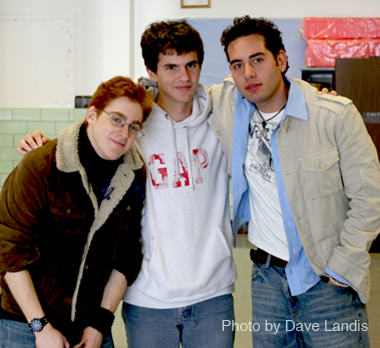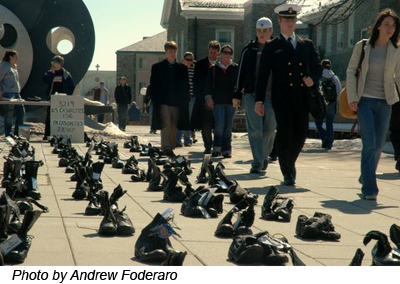Mary Lou Cummings, Perkasie
cumminghome@comcast.net
 According to the teachings of Eastern Mennonite University professor, Dr. Lisa Schirch, peacebuilding is a verb full of adventure, drama, and creativity. Learning how to build peace has not only taken her to Iraq, but also to West Point and Carlisle Military Academies as well as Joint Forces Command – not the usual pacifist’s approach.
According to the teachings of Eastern Mennonite University professor, Dr. Lisa Schirch, peacebuilding is a verb full of adventure, drama, and creativity. Learning how to build peace has not only taken her to Iraq, but also to West Point and Carlisle Military Academies as well as Joint Forces Command – not the usual pacifist’s approach.
In her experiences in Iraq with Mennonite Central Committee (MCC), Schirch found that community development projects – digging wells, sharing water, starting small businesses – were natural peacebuilding events. “Sunni, Shiite, and Kurdish people came together as they worked out how to build the well and how to share the water,†she said. “And the development projects created jobs for young men in villages where the unemployment rates have soared to 50-70 percent. Imagine what American cities would be like if the unemployment rates were that high.â€
As she was preparing to leave, Iraqis came to her and said, “It was wonderful that you came here to teach us about peacebuilding with MCC, but what are you doing about U.S. foreign policy at home?†According to Schirch, she’s heard that countless times before while working in various places around the world, and most recently while she was in Indonesia this past May.
Her response to this question is to spend about two days each week in Washington, D.C., meeting with many different groups and individuals, members of Congress, and military personnel. Her ability to listen with genuine respect often gains her access to real conversations. For example, Schirch says she hears two sets of questions that usually begin the conversation on peacebuilding. The first is, “Why do other countries hate us? What will keep us safe?†The second is,“How can we protect the American way of life? How can we keep our cheap oil and protect our economic dominance?â€
“Well, war has not produced the hoped-for safety; in fact it has been drastically counter-productive. So, what would work better? To protect the American way of life for the next 40 years, the U.S. will have to reserve for itself half of the planet’s resources. That may not be viable! It is time for creative new thinking.â€
In her presentation, Schirch described a national security strategy as a three-part framework: development, diplomacy, and defense. All three are important. However, while the U.S. spends $1 billion per week on the Iraq War, it only spends half of one percent of the national budget on international development assistance, and much of that serves only to bolster U.S. interests. Schirch directs a project called The 3D Initiative at Eastern Mennnonite University’s (Harrisonburg, VA) Center for Justice and Peacebuilding, a project that aims to advocate for more balanced spending and effort in development and diplomacy.
 “The failures in Iraq have many people in the military beginning to lose their faith in firepower and interested in thinking about a different way of building security. The military academies are introducing courses on conflict resolution.â€
“The failures in Iraq have many people in the military beginning to lose their faith in firepower and interested in thinking about a different way of building security. The military academies are introducing courses on conflict resolution.â€
One reason for much of her travel abroad is that universities in many countries ask for help to initiate peacebuilding and conflict resolution courses in their curriculum. This is new and positive, as it has become clear – on an international scale – that war does not produce much. Except hatred.
For more information, see 3Dsecurity.org or The Little Book of Strategic Peacebuilding, by Schirch. Photos provided by Mary Lou Cummings

 In the remote West bank village of At-Tuwani, our May 2007 Christian Peacemaker Team delegation sat listening to village leader, Hafez, tell stories of the harassment the village faces from the nearby Israeli settlers, and the lack of police investigation and prosecution of these crimes.
In the remote West bank village of At-Tuwani, our May 2007 Christian Peacemaker Team delegation sat listening to village leader, Hafez, tell stories of the harassment the village faces from the nearby Israeli settlers, and the lack of police investigation and prosecution of these crimes.
 I look forward to the vast array of experiences that await me at New Hope. I hope to form meaningful relationships with people and listen to the stories of others, learning from those around me. I anticipate that the new setting will give me new ideas, new energy, and a renewed hope for what the Mennonite Church is and will become. I look forward to this opportunity as I explore further what it means to be part of the Anabaptist/Mennonite church and take part in God’s exciting work in the world.
I look forward to the vast array of experiences that await me at New Hope. I hope to form meaningful relationships with people and listen to the stories of others, learning from those around me. I anticipate that the new setting will give me new ideas, new energy, and a renewed hope for what the Mennonite Church is and will become. I look forward to this opportunity as I explore further what it means to be part of the Anabaptist/Mennonite church and take part in God’s exciting work in the world.

 Life seems to come at you faster than you can blink. I closed my eyes for one second as I was on a bicycle climbing the continental divide and when I opened my eyes I was standing among people at a vigil in Pittsburgh.
Life seems to come at you faster than you can blink. I closed my eyes for one second as I was on a bicycle climbing the continental divide and when I opened my eyes I was standing among people at a vigil in Pittsburgh. I like new experiences – things that pluck me from my comfort zone and force me to learn and grow. This is one of the reasons I chose to do a term of service with Mennonite Voluntary Service. I decided to assist with policy work around workers rights and workplace justice at an organization called the Employment Justice Center in the District of Columbia. I graduated with an undergraduate degree in Psychology from
I like new experiences – things that pluck me from my comfort zone and force me to learn and grow. This is one of the reasons I chose to do a term of service with Mennonite Voluntary Service. I decided to assist with policy work around workers rights and workplace justice at an organization called the Employment Justice Center in the District of Columbia. I graduated with an undergraduate degree in Psychology from